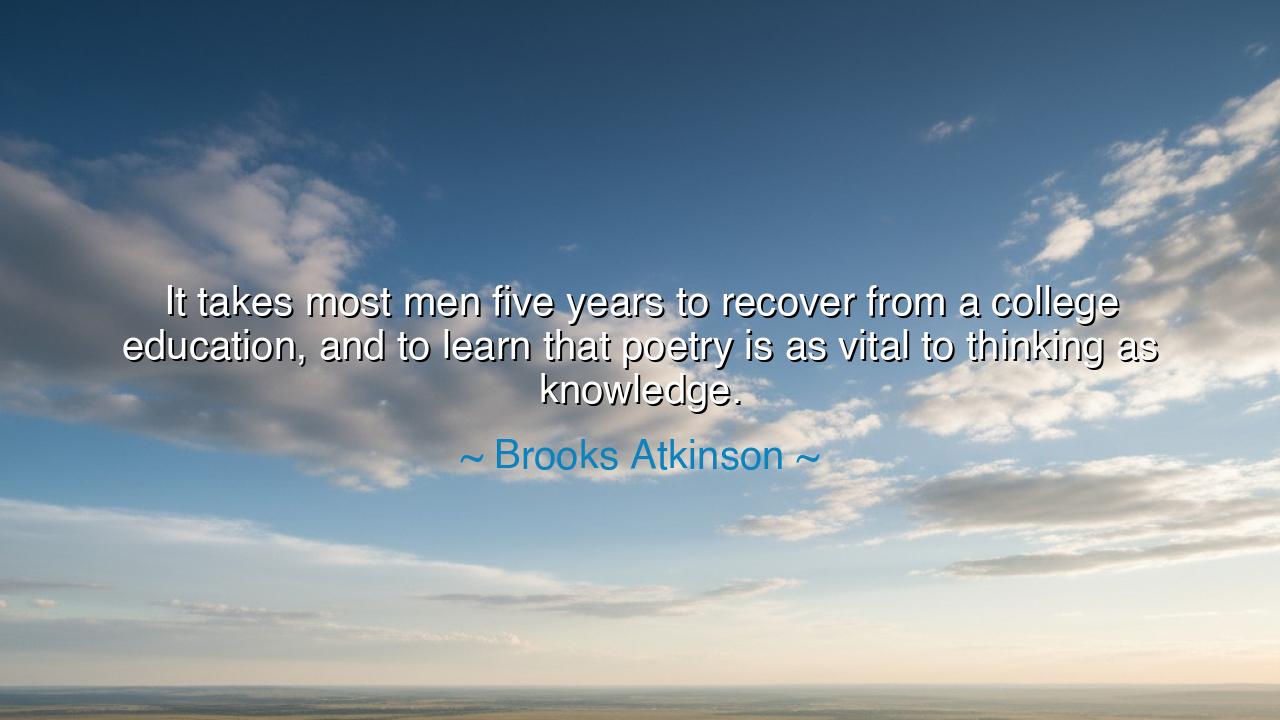
It takes most men five years to recover from a college education
It takes most men five years to recover from a college education, and to learn that poetry is as vital to thinking as knowledge.






The critic and philosopher of the spirit, Brooks Atkinson, once spoke a truth both piercing and compassionate: “It takes most men five years to recover from a college education, and to learn that poetry is as vital to thinking as knowledge.” Within this paradox lies both humor and revelation, for Atkinson saw that formal education, while noble in aim, often hardens the heart and narrows the vision. The mind trained only in analysis and fact becomes like a sword too finely honed—it cuts but cannot embrace. His words are not an attack on learning, but a reminder that knowledge without imagination, and intellect without wonder, are barren things.
Atkinson was a theater critic, a man who spent his life listening for truth in art, in human voice, and in the trembling of the stage. From this vantage, he saw a strange tragedy unfold: men and women who had received the finest educations but had forgotten how to feel. They emerged from universities filled with facts but empty of vision, speaking with authority but not wisdom. It took years, he observed, for them to “recover”—to shed the rigidity of academia and rediscover the deeper currents of the human spirit. To recover from education was, in truth, to remember what education had forgotten: that knowledge is only half of understanding, and that poetry—the language of the heart—is the other half.
In his words, “poetry is as vital to thinking as knowledge.” This is no mere metaphor. Poetry, to Atkinson, meant more than verses or rhymes—it meant the capacity for insight, for beauty, for perceiving unity where others see only parts. Poetry is that inner music which binds thought to emotion, intellect to soul. Knowledge may explain the world, but poetry allows us to feel it; knowledge builds the bridge, but poetry makes us cross it. Without poetry, thinking becomes mechanical, clever but cold; with poetry, thought becomes creative, compassionate, and alive.
Consider the life of Albert Einstein, whose genius reshaped the universe of physics. When asked about his discoveries, Einstein often spoke of imagination, not mathematics. “Imagination,” he said, “is more important than knowledge.” It was poetry—dreaming in symbols and visions—that led him to the theory of relativity. The language of numbers came after. Einstein’s education gave him tools, but it was his poetic spirit that unlocked the cosmos. His life stands as proof of Atkinson’s truth: the mind that cannot dream can never truly think.
Atkinson’s quote also exposes the limitations of an age that exalts practicality over inspiration. Many are taught to memorize, to calculate, to argue, but few are taught to wonder. The modern world trains its children for success, not for meaning. Yet a civilization that neglects poetry, that scorns imagination as frivolous, will one day find its knowledge hollow and its progress joyless. A people may build cities of steel and light, but if they forget beauty, their hearts become deserts. The recovery from education is, therefore, not rebellion—it is renewal. It is the rediscovery of the soul’s voice in a world that teaches silence.
O listener, learn from this wisdom: Do not let knowledge choke the roots of wonder. Study deeply, but do not let your learning become a prison. When you read, listen for the heartbeat behind the words. When you think, let feeling guide you. Read poetry—not only from books, but from life itself: in the cry of the child, the song of the wind, the quiet courage of ordinary days. Let art, nature, and love teach you what no institution can. For wisdom is not the stacking of facts but the awakening of perception.
The lesson of Atkinson’s words is clear and eternal: knowledge fills the mind, but poetry fills the soul—and only together can they make a complete human being. To live rightly, one must balance reason with reverence, precision with passion, intellect with imagination. The educated man who cannot feel beauty is half asleep; the poet who cannot think is half blind. Seek, then, the union of both. Let your learning be tempered by compassion, your logic warmed by wonder, and your reason illuminated by art. For in that harmony lies the highest form of thought, and the truest kind of wisdom—the wisdom that does not merely know, but understands.






AAdministratorAdministrator
Welcome, honored guests. Please leave a comment, we will respond soon